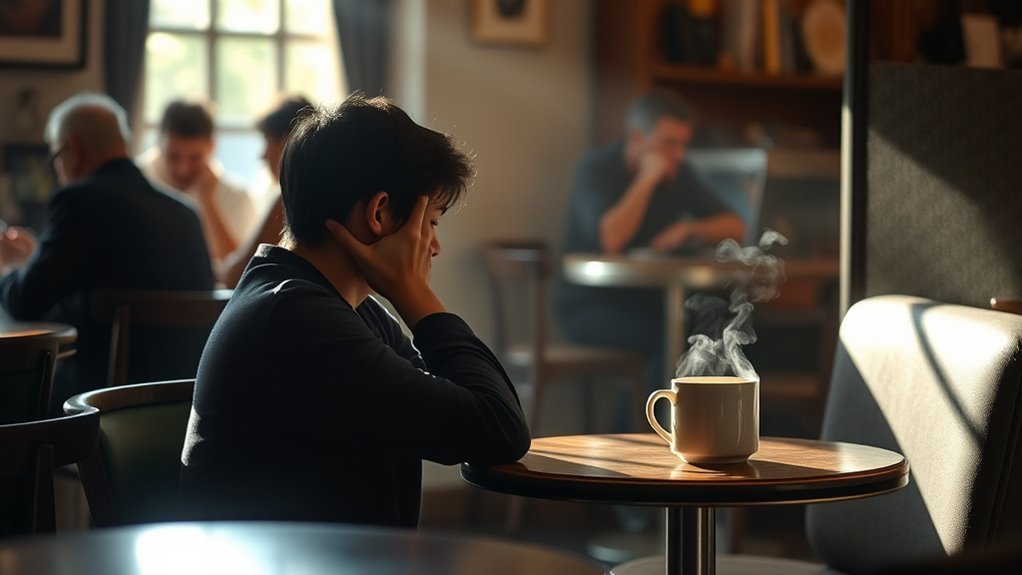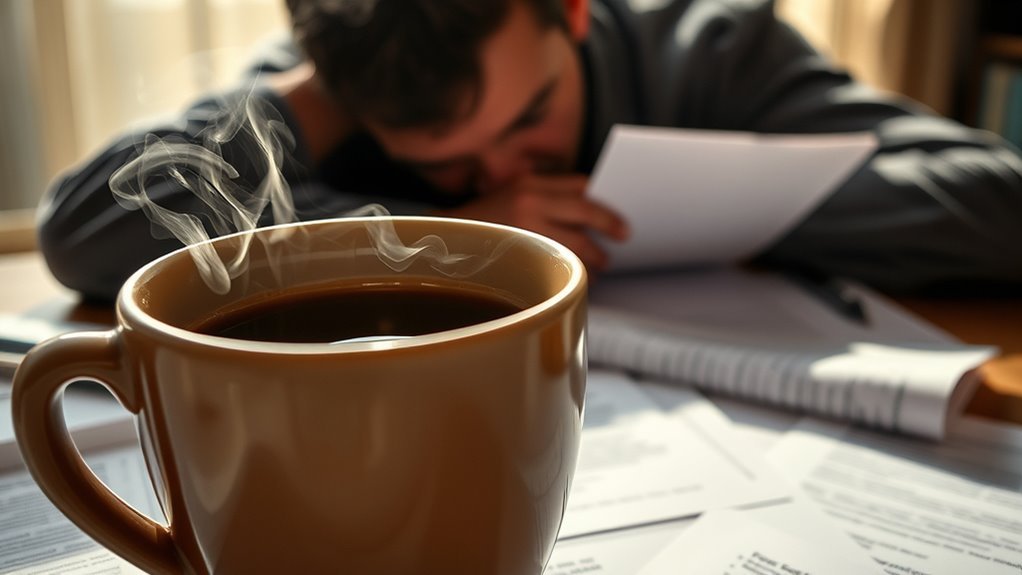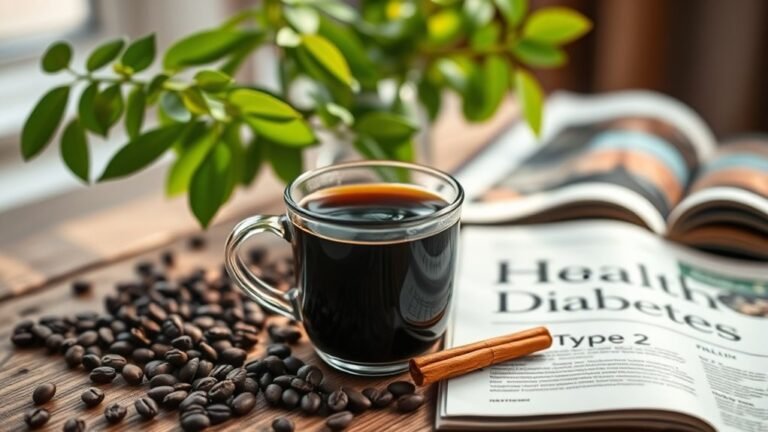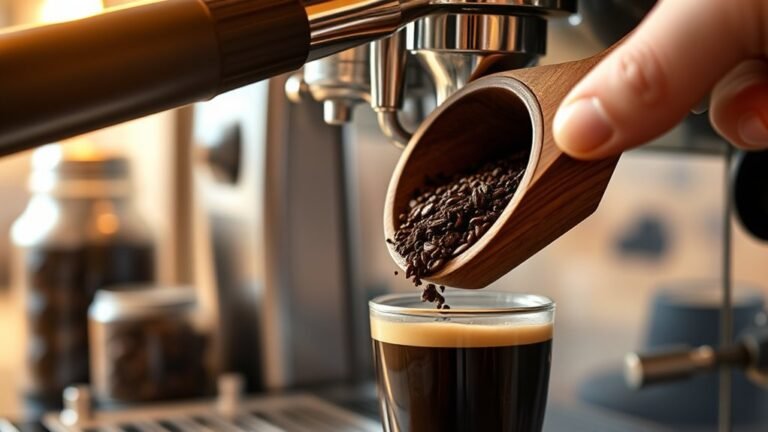Can I Have Coffee With a Concussion
You can have coffee with a concussion, but it’s essential to be cautious. Moderate caffeine may not hinder your recovery, while high intake can increase anxiety and disrupt sleep. Individual responses vary, so closely monitor your symptoms after consuming caffeine. If your symptoms worsen, consider reducing or eliminating it completely. Staying hydrated is also vital during recovery. For further insights on safe caffeine consumption and alternatives, explore more information on this topic.
Understanding Concussions: What Happens to Your Brain

A concussion is more than just a bump on the head; it’s a complex brain injury that disrupts normal brain function. When you experience a concussion, the impact can lead to cellular damage, affecting neurotransmitter release and impairing cognitive function. You might notice symptoms like confusion, memory issues, or difficulty concentrating, all of which indicate that your brain isn’t operating at peak efficiency. Studies show that even mild concussions can have lasting effects, particularly on attention and processing speed. It’s essential to understand that your brain needs time to heal, and pushing through symptoms can exacerbate the injury. Recognizing these cognitive changes is important for recovery and reclaiming your mental freedom. Prioritizing rest and seeking professional advice can facilitate healing.
The Role of Caffeine in the Body
Caffeine affects your brain by blocking adenosine receptors, which can enhance alertness but may also interfere with recovery from a concussion. While moderate consumption might not hinder healing, excessive caffeine can lead to increased anxiety and disrupted sleep, both vital for recovery. Understanding these dynamics is essential when considering whether to include caffeine in your routine during recovery.
Caffeine’s Effects on Brain
Numerous studies have examined how caffeine interacts with the brain, revealing its complex effects on cognitive function and neurological health. Caffeine metabolism affects how quickly and effectively your body processes this stimulant, influencing your alertness and focus. By blocking adenosine receptors, caffeine alters neural pathways, enhancing neurotransmitter release, which can improve mood and cognitive performance. However, the relationship isn’t entirely straightforward; excessive caffeine may lead to anxiety or sleep disturbances. It’s important to find a balance. While moderate consumption is generally safe, especially for those seeking mental clarity, understanding your unique response to caffeine is essential. Ultimately, you’ll want to take these factors into account when deciding if coffee is appropriate for you, particularly in the context of recovery from a concussion.
Caffeine and Recovery Time
While many people rely on caffeine for its stimulating effects, its role in recovery from a concussion is less straightforward. Caffeine metabolism can vary considerably among individuals, affecting how it influences recovery strategies. Some studies suggest that caffeine might aid in cognitive function and reduce headache severity, but it’s essential to approach its use cautiously.
Here’s a summary of caffeine’s potential effects during recovery:
| Effect | Consideration |
|---|---|
| Cognitive Enhancement | May improve focus |
| Headache Relief | Can alleviate symptoms |
| Sleep Disruption | May hinder restorative sleep |
| Individual Variation | Metabolism differences |
Ultimately, balancing caffeine intake is vital during your recovery period. Listen to your body and consult with healthcare professionals for tailored advice.
Risks of Overconsumption
Although many people enjoy the stimulating effects of caffeine, overconsumption can lead to significant health risks, particularly when recovering from a concussion. Excessive caffeine intake may exacerbate symptoms and interfere with your healing process. Here are some risks to take into account:
- Increased anxiety and restlessness
- Disrupted sleep patterns, hindering recovery
- Potential for caffeine withdrawal symptoms if intake is suddenly reduced
- Dehydration, especially if hydration strategies aren’t prioritized
When you’re recovering, it’s essential to monitor your caffeine intake carefully. Balancing your consumption with proper hydration can help mitigate some risks, allowing you to focus on healing. Remember, moderation is key, so be mindful of how much caffeine you consume as you navigate your recovery journey.
How Caffeine Affects Concussion Symptoms
Caffeine’s impact on concussion symptoms can be quite significant, and understanding this relationship is essential for recovery. While caffeine can provide temporary relief from headaches and fatigue, it can also exacerbate symptoms during withdrawal. If you regularly consume caffeine and suddenly cut back, you might experience withdrawal symptoms, including increased irritability and diminished focus. Additionally, maintaining hydration balance is vital after a concussion, as dehydration can worsen symptoms. Caffeine, being a diuretic, may contribute to dehydration if consumed in excess. Consequently, while a moderate amount of caffeine might offer short-term benefits, it’s essential to approach consumption cautiously, keeping in mind your hydration needs and potential withdrawal effects. Always prioritize your overall well-being during recovery.
Expert Opinions on Coffee Consumption Post-Concussion

Many experts have differing views on coffee consumption following a concussion, particularly regarding its potential benefits and drawbacks. Some suggest that moderate caffeine intake can help alleviate headaches, while others warn against it due to risks associated with caffeine withdrawal.
Consider these points:
- Caffeine withdrawal: Sudden cessation may aggravate headaches or fatigue.
- Hydration strategies: Coffee can be dehydrating; make certain you’re also consuming water.
- Individual tolerance: Responses vary; some may find relief, while others experience increased symptoms.
- Timing matters: Early post-injury consumption might differ from later stages of recovery.
Ultimately, it’s essential to consult with a healthcare professional to tailor your caffeine intake to your specific recovery needs.
Individual Differences: How Caffeine Affects Different People
While responses to caffeine can vary considerably among individuals, understanding these differences is vital for anyone recovering from a concussion. Some people have high caffeine sensitivity, meaning even small amounts can exacerbate symptoms like headaches or anxiety. Others may possess a higher individual tolerance, allowing them to consume coffee without noticeable side effects. This variance can stem from genetic factors, habitual consumption, or underlying health conditions. If you’re in recovery, it’s important to monitor how caffeine impacts your symptoms. Tracking your reactions can help you determine whether it’s beneficial or detrimental to your healing process. Ultimately, personalizing your caffeine intake based on your unique response can empower you to make informed choices during your recovery.
Alternatives to Coffee During Recovery

For individuals recovering from a concussion, exploring alternatives to coffee can be beneficial, especially if caffeine sensitivity is a concern. Staying hydrated and promoting healing is essential during recovery, and various options can help achieve that without the jittery effects of caffeine. Consider these alternatives:
Exploring caffeine-free alternatives during concussion recovery promotes hydration and healing without the jitters.
- Herbal teas: Chamomile or ginger can soothe and provide antioxidants.
- Decaffeinated beverages: These mimic coffee’s rich flavor without caffeine.
- Coconut water: A natural hydration alternative rich in electrolytes.
- Fruit-infused water: Adds flavor and vitamins, encouraging fluid intake.
These options can enhance well-being while you recover, allowing you to avoid potential exacerbation of symptoms linked to caffeine consumption. Prioritize hydration and nourishment for ideal recovery.
Tips for Safe Caffeine Consumption After a Concussion
Although caffeine can be tempting during recovery, it’s vital to approach its consumption with caution after a concussion. Start by practicing caffeine moderation; limiting your intake to avoid exacerbating symptoms like headaches or anxiety. Aim for a small cup of coffee rather than multiple servings.
Additionally, prioritize hydration importance. Dehydration can worsen concussion symptoms, so balance your caffeine with plenty of water. Consider timing; consuming caffeine too late in the day may disrupt your sleep, which is critical for recovery.
Listen to your body—if you notice increased symptoms after having caffeine, it might be wise to cut back or eliminate it altogether. By being mindful of these tips, you can navigate caffeine consumption safely while supporting your recovery.
Monitoring Your Symptoms: When to Seek Help

How can you tell when it’s time to seek medical help after a concussion? Monitoring your symptoms is essential, and recognizing emergency signs can make all the difference. If you’re symptom tracking, be on the lookout for:
- Persistent headache that worsens
- Repeated vomiting or nausea
- Difficulty waking up or staying awake
- Slurred speech or confusion
These indicators suggest that your condition may be more serious than initially thought. If you experience any of these symptoms, don’t hesitate to reach out for professional help. It’s better to err on the side of caution, ensuring your health and well-being are prioritized. Remember, seeking help early can prevent complications and aid in your recovery process.
Frequently Asked Questions
Can I Drink Decaf Coffee After a Concussion?
After a concussion, you might wonder if decaf options are safe. While decaf coffee has markedly less caffeine, it’s important to contemplate how caffeine affects recovery. Caffeine can influence sleep and hydration, both critical for healing. If you’re sensitive to caffeine or experiencing symptoms, you may want to avoid decaf as well. Always listen to your body and consult with a healthcare professional to determine what’s best for your recovery.
What Are Signs I Should Stop Drinking Coffee?
If you’re sipping your favorite brew and start feeling jittery, it might be time to reassess your relationship with caffeine. Signs you should stop drinking coffee include increased heart rate, anxiety, or trouble sleeping. These symptoms could indicate caffeine sensitivity, especially during concussion recovery. Listening to your body is key; if you’re feeling off, consider taking a break. Prioritizing your health and well-being grants you the liberation to enjoy life more fully.
How Long Should I Wait Before Having Coffee?
When considering how long to wait before having coffee, it’s essential to think about your concussion recovery. Research suggests that caffeine can affect your brain’s healing process, potentially worsening symptoms like headaches or dizziness. Generally, it’s advisable to wait at least 24 to 48 hours post-injury before reintroducing caffeine. Listen to your body; if you’re still experiencing symptoms, it might be wise to extend that wait for ideal recovery.
Can Other Caffeinated Beverages Be Consumed?
When you’re pondering whether to indulge in other caffeinated beverages, it’s essential to reflect on caffeine effects on your body, especially post-injury. While you might crave a fizzy energy drink, remember that hydration is just as important. Caffeine can dehydrate you, so balance is key. Opt for water or electrolyte-rich drinks to stay hydrated. If you do choose caffeinated options, moderation’s your best bet for maintaining both hydration and mental clarity.
Is Herbal Tea a Safe Alternative to Coffee?
Herbal tea is often considered a safe alternative to coffee, especially if you’re looking for caffeine alternatives. It offers various herbal tea benefits, such as calming effects and hydration, without the stimulating properties of caffeine. While some herbal teas can provide gentle energy boosts, they generally promote relaxation. If you’re seeking a soothing beverage, herbal tea can be a wise choice, allowing you to enjoy flavors and benefits without adverse effects on your health.






